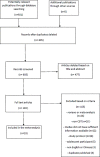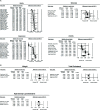Effects of Cognitive Behavioral Therapy-Based Intervention on Improving Glycaemic, Psychological, and Physiological Outcomes in Adult Patients With Diabetes Mellitus: A Meta-Analysis of Randomized Controlled Trials
- PMID: 32848906
- PMCID: PMC7399630
- DOI: 10.3389/fpsyt.2020.00711
Effects of Cognitive Behavioral Therapy-Based Intervention on Improving Glycaemic, Psychological, and Physiological Outcomes in Adult Patients With Diabetes Mellitus: A Meta-Analysis of Randomized Controlled Trials
Abstract
Background: Patients with diabetes mellitus (DM) have a high risk of secondary physiological and psychological complications. Some interventions based on cognitive behavioral therapy (CBT) have been used to control glucose levels and improve negative emotions of patients with DM. This study was undertaken to provide an overview of the effectiveness of CBT-based interventions for improving glycaemic control, psychological, and physiological outcomes in adult patients with DM.
Methods: Randomized controlled trials (RCTs) published in English and Chinese during 2007 and April 2019 were searched through various electronic databases including PubMed, Cochrane Library, Scopus, Embase, ProQuest Dissertations and Theses, and the Chinese databases (WanFang data and China National Knowledge Infrastructure). The primary outcome variables included glycated haemoglobin (HbA1c), fasting plasma glucose (FPG), depression, and anxiety symptoms. The secondary outcomes were weight and cholesterol. Effect sizes were pooled by random-effects modelling using Comprehensive Meta-Analysis software. Physiotherapy Evidence Database tool was used to assess the quality of all included studies.
Results: Twenty-three RCTs comprising 2,619 patients with DM (type 1 and type 2) were included in at least one meta-analysis. The results of the main analysis showed that CBT-based interventions had a better effect on reduced HbA1c (-0.275%, 95% CI: -0.443 to -0.107; p < 0.01) with Hedge's g of 0.466 (95% CI: 0.710 - 0.189), reduced depression symptoms with average reduction of -2.788 (95% CI: -4.450 to -1.207; p < 0.01) and Hedge's g of 0.966 (95% CI: 1.507 - 0.426). Twenty-three RCTs comprising 2,619 patients with DM (type 1 and type 2) were included in this meta-analysis. Several mediators of the effect were found through subgroup analysis for HbA1c and depression symptoms. The interventions emphasising completion homework assignments, stress management, and that used an interpersonal strategy delivered via a group had a better effect on both HbA1c and depression symptoms. In addition, behavioral strategies had a better effect on glycaemic control, and cognitive strategies had a better effect on depression symptoms. There was no difference in the change of FPG, anxiety symptoms, weight, and high-density lipoprotein cholesterol (HDL-C) between CBT-based interventions and the control conditions.
Conclusions: The findings indicate that CBT-based interventions are effective for improving glycaemic control and depression symptoms in adult patients with type 1 DM (T1DM) or type 2 DM (T2DM) with moderate to large effect size. The results of the subgroup analysis suggest that it is necessary to adopt different types and technical components of CBT according to the population and purpose of the treatment in clinical practice. Due to the high heterogeneity of included studies and other limitations, further study including large number of studies is needed to confirm these results.
Keywords: cognitive behavioral therapy; diabetes mellitus; glycaemic control; meta-analysis; mood symptoms.
Copyright © 2020 Yang, Li and Sun.
Figures


References
-
- Chapman A, Liu S, Merkouris S, Enticott JC, Yang H, Browning CJ, et al. Psychological Interventions for the Management of Glycemic and Psychological Outcomes of Type 2 Diabetes Mellitus in China: A Systematic Review and Meta-Analyses of Randomized Controlled Trials. Front Public Health (2015) 3:252. 10.3389/fpubh.2015.00252 - DOI - PMC - PubMed
Publication types
LinkOut - more resources
Full Text Sources
Medical
Miscellaneous

